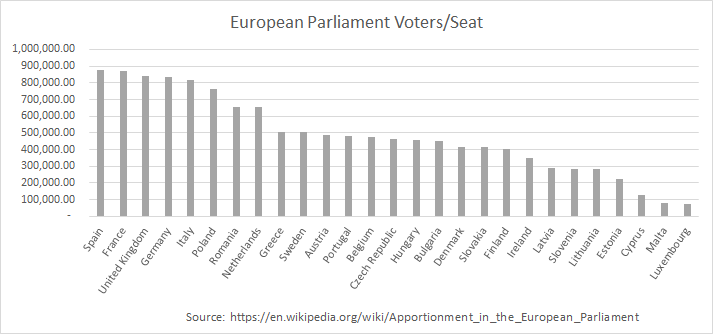I got involved in a debate, sort of. Labour has decided that FPTP weakens trust in politics, but that fixing it is not a first term priority; many careerists in the Party oppose changing the voting system but the argument against PR that it enables the far right and claiming that PR’s supporters do so because of this is dishonest.
We should have PR because everyone’s vote is equal, Parties will then need to address all their voters, not just those that live in swing seats! Good PR systems do not require to be gamed to get the result a voter wants i.e. voters vote for whom they want and do not need to guess what others will do. Finally, government coalitions are negotiated after the election, in a Parliament, and with a mandate, not in secret, in Party offices.
In making this argument, I stated that Parliaments must make governments. Some may argue and more frequently apply this to Executive Mayors, that restricting government making (or mayor/council leader making) to several hundred MPs and Mayors/leaders to even fewer councillors is undemocratic. I don’t agree.
I think governments should be elected/appointed by Parliaments, and so reject the need to balance a vote for government with a vote for an MP.
The German system makes each vote worth the same as others; although you might want to argue that their minimum threshold required for representation makes this untrue but I don’t. Any AMS system where the number of additional members equals or exceeds the geographic members and the size is relatively large meets the test of equality of votes and also minimises any ‘wasted’ votes.
I was asked to name an election where a far-right candidate won on 1st past the post and named Trump in 2020. I was criticised for calling Trump a fascist as it is generally accepted in the circles that I mix that fascism is a particularly vicious form of antidemocratic, anti-working class politics. I agree that Trump 2020 was not a fascist, it was my critics initial carelessness with the word that led me to reply in that way.
Ben-Ghiat in her book, “Strongmen” shows fascism is less of a threat than it once was, it’s been replaced by military dictators and latterly by vicious kleptocracies and is more often described as authoritarianism or totalitarianism. We also need to look at the work of Juan Linz on Presidencies and Parliaments, he favours the latter because they can compromise and effectively recall governments. Ben-Ghiat highlights seventeen dictators and authoritarians, eight of whom came to power through elections. Too many did so by winning nationwide presidential elections with or without transfers and what is common is that these elections create a large constituency (and in the USA & UK, majorities) who will not consent to their opponents having that power, even with legal checks and balances. Parliamentary systems elected with fair votes are a better means of expressing the solidarity needed to defeat these people.
The problem is elections with only one winner!
Democracy is about more than voting, it requires rights, checks & balances, and recall. Directly elected governments, led by Mayors or Presidents have shown repeatedly that they are vulnerable to corruption and often decline into authoritarian rules. As said, Ben-Ghiat lists seventeen, eight of whom came to power through election.
You can’t build a good society, based on taking control of the state, one committee at a time, each with a one vote majority based on an electoral system where votes in the legislature are won on a simple plurality.
So, sure, I think that Parliaments electing/appointing/firing governments is democratic.
- My notes on Linz and his work, https://davelevy.info/wiki/on-presidentialism/
- Strongmen: Mussolini to the present, Author: Ruth Ben-Ghiat, Pub date: 2020/11/10, Publisher: WW Norton & Company
- Image Credit: from unsplash by Mark Stucky
…





